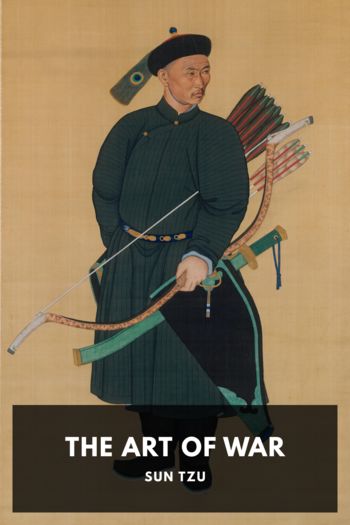Tao Te Ching, Laozi [the gingerbread man read aloud TXT] 📗

- Author: Laozi
Book online «Tao Te Ching, Laozi [the gingerbread man read aloud TXT] 📗». Author Laozi
天道, “The Way of Heaven;” but the chapter contrasts that way, unselfish and magnanimous, with the way of man, selfish and contracted, and illustrates the point by the method of stringing a bow. This must be seen as it is done in China fully to understand the illustration. I have known great athletes in this country tasked to the utmost of their strength to adjust and bend a large Chinese bow from Peking.
The “sage” of par. 4 is the “King” of ch. 25. Compare what is said of him with ch. 2, par. 4, et al. ↩
任信, “Thing to be Believed.” It is difficult to give a short and appropriate translation of this title. The chapter shows how the most unlikely results follow from action according to the Tao.
Par. 1. Water was Laozi’s favourite emblem of the Tao. Compare chapters 8, 66, et al.
Par. 2. Compare ch. 36, par. 2.
Par. 3. Of course we do not know who the sage was from whom Laozi got the lines of this paragraph. They may suggest to some readers the lines of Burns, as they have done to me:—
“This honest man, though e’er so poor,
Is king o’ men for a’ that.”
But the Taoist of Laozi is a higher ideal than Burn’s honest man.
Par. 4 is separated from this chapter, and made to begin the next by Wu Chʽêng. ↩
任契, “Adherence to Bond or Covenant.” The chapter shows, but by no means clearly, how he who holds fast to the Tao will be better off in the end than he who will rather try to secure his own interests.
Par. 1 presents us with a case which the statements of the chapter are intended to meet:—two disputants, one good, and the other bad; the latter, though apparently reconciled, still retaining a grudge, and ready to wreak his dissatisfaction, when he has an opportunity. The 爲 = “for,” “for the good of.”
Par. 2 is intended to solve the question. The terms of a contract or agreement were inscribed on a slip of wood, which was then divided into two; each party having one half of it. At the settlement, if the halves perfectly fitted to each other, it was carried through. The one who had the right in the dispute has his part of the agreement, but does not insist on it, and is forbearing; the other insists on the conditions being even now altered in his favour. The characters by which this last case is expressed, are very enigmatical, having reference to the satisfaction of the government dues of Laozi’s time—a subject into which it would take much space to go.
Par. 3 decides the question by the action of heaven, which is only another name for the course of the Tao. ↩
獨立, “Standing Alone.” The chapter sets forth what Laozi conceived the ancient government of simplicity was, and what he would have government in all time to be. He does not use the personal pronoun “I” as the subject of the thrice-recurring 使, but it is most natural to suppose that he is himself that subject; and he modestly supposes himself in charge of a little state and a small population. The reader can judge for himself of the consummation that would be arrived at;—a people rude and uninstructed, using quippos, abstaining from war and all travelling, kept aloof from intercourse even with their neighbours, and without the appliances of what we call civilisation.
The text is nearly all found in Ssŭ-ma Chʽien and Chuang-tzŭ. The first member of par. 1, however is very puzzling. The old Jesuit translators, Julien, Chalmers, and V. von Strauss, all differ in their views of it. Wu Chʽêng and Chiao Hung take what I have now rendered by “abilities,” as meaning “implements of agriculture,” but their view is based on a custom of the Han dynasty, which is not remote enough for the purpose, and on the suppression, after Wang Pi, of a 人 in Ho-shang Kung’s text. ↩
顯質, “The Manifestation of Simplicity.” The chapter shows how quietly and effectively the Tao proceeds, and by contraries in a way that only the master of it can understand. The author, says Wu Chʽêng, “sums up in this the subject-matter of the two parts of his treatise, showing that in all its five thousand characters, there is nothing beyond what is here said.”
Par. 2 suggests to Dr. Chalmers the well-known lines of Bunyan as an analogue of it:—
“A man there was, though some did count him mad,
The more he gave away, the more he had.”
Wu Chʽêng brings together two sentences from Chuang-tzŭ (XXXIII 21 b, 22 a), written evidently with the characters of this text in mind, which as from a Taoist mint, are a still better analogue, and I venture to put them into rhyme:—
“Amassing but to him a sense of need betrays;
He hoards not, and thereby his affluence displays.”
I have paused long over the first pair of contraries in par. 3 (利 and 害). Those two characters primarily mean “sharpness” and “wounding by cutting;” they are also often used in the sense of “being beneficial,” and “being injurious;”—“contraries,” both of them. Which “contrary” had Laozi in mind? I must think the former, though differing in this from all previous translators. The Jesuit version is, “Celestis Tao natura ditat omnes, nemini





Comments (0)